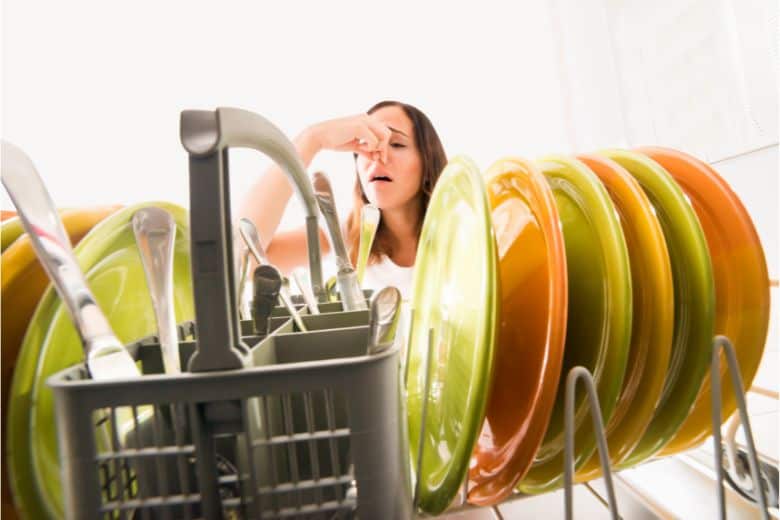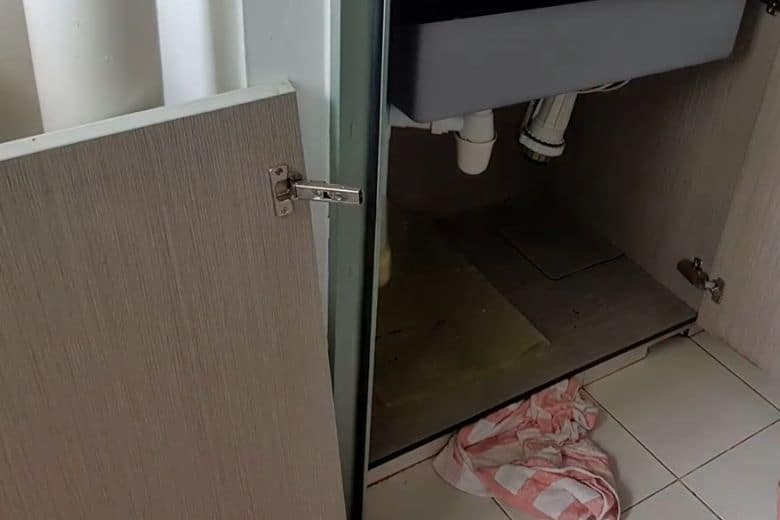Do you suddenly hit by the egg-like awkward smell from your dishwasher? Yuck! If yes, indeed, you got to wonder and think, why does my dishwasher smell like rotten eggs?
Although it occasionally happens, it requires immediate attention and action. Because this uninvited odor can be appalling.
However, this stiff smell is most likely caused by a buildup of food particles and grease in the appliance. Besides, bacteria break down, and organic matter can also be the culprit.
No matter the reason, we will figure out all the causes of that foul odor. Furthermore, discuss the solutions to make your dishwasher smell fresh again.
So, let’s move forward and uncover the mysteries behind the rotten egg smell in your dishwasher.
The Potential Causes and Solution for Dishwasher Smell Like Rotten Eggs
Well, we have researched and found the reasons and solutions for each issue mentioned below for that rotten eggs-like smell from the dishwasher. Have a look.
1. Decaying Food Particles
Sometimes, small food particles can get trapped in the dishwasher. As they decay, they release a rotten smell. Like leaving leftovers in the fridge for too long, food particles trapped in the dishwasher create a perfect environment for smells.
These bits of food can get stuck, and as they decompose, they smell.
Solution
- Empty the dishwasher, removing all dishes, utensils, and racks.
- Inspect the interior of the dishwasher for visible food particles or debris.
- Use a clean cloth or sponge soaked in the vinegar-water solution to wipe down the dishwasher’s interior, including walls, door, racks, and any removable parts.
- Pay special attention to hard-to-reach areas such as the spray arms, filters, and crevices.
- Remove the dishwasher filter and clean it thoroughly under running water to remove any trapped food particles.
- Mix a solution of equal parts vinegar and water in a bowl or bucket.
- Use a clean cloth or sponge soaked in the vinegar-water solution to wipe down the interior of the dishwasher, including walls, door, racks, and any removable parts.
- Run a hot water cycle without any dishes or detergent to help flush out any remaining food particles.
- Consider using a dishwasher cleaner specifically designed to remove food residue and eliminate odors. Follow the instructions on the cleaner for the best results.
2. Bacterial Growth
These little villains call bacteria love moisture and food. Eventually, your dishwasher can provide the perfect breeding ground if not properly maintained. The decomposition of food particles trapped in filters, crevices, or rubber seals. Therefore, they lead to the release of hydrogen sulfide gas, resulting in the rotten egg smell.
Solution
To address the issue of bacterial growth in the drain, you have to clean the dishwasher drain and the garbage disposal (if applicable). Start by removing any visible debris or food particles from the drain. Then, mix equal vinegar and water and pour it down the drain.
Allow it to sit for about 15 minutes before rinsing it with hot water. It will help eliminate any remaining bacteria and remove unpleasant odors.
3. Hydrogen Sulfide in Water
In some cases, the odor source might be the water supply itself. Hydrogen sulfide, a naturally occurring gas in groundwater, can give off a distinct rotten egg smell when it reacts with certain bacteria or hot water.
Solution
- Ventilate the area by opening windows or turning on exhaust fans.
- Empty the dishwasher completely.
- Create a cleaning solution by mixing equal parts vinegar and water.
- Wipe down the dishwasher’s interior with the vinegar-water solution, including walls, doors, racks, and removable parts.
- Run a hot water cycle with a cup of vinegar on the top rack to eliminate odors and disinfect.
- Sprinkle a cup of baking soda on the bottom of the dishwasher and run another hot water cycle to neutralize the remaining odors.
- Perform a final rinse cycle using only hot water.
4. Clogged Drainage System
Have you ever had a clogged sink that smells? If the water isn’t draining properly in your dishwasher, it becomes a stagnant pool of obscurity. It can lead to those rotten egg smells you dread.
Solution
Ensure the drainage system is clear. Regularly check and, if necessary, clean the filters and drainage area. It will help keep the water flowing and the smells away.
- Snake it out: Use a plumbing snake to remove potential pipe blockages.
- Call in the cavalry: If snaking doesn’t work, it’s time to call a professional plumber.
5. Hard Water Issues
Another culprit behind the rotten egg smell is hard water. Minerals in hard water can react with deposited food particles, causing a foul smell.
Solution- Using Water Softeners
Adding a water softener to your dishwasher can help reduce the minerals in hard water. It, in turn, minimizes the reactions that cause the rotten egg smell.
6. Failing Components
A malfunctioning dishwasher can also contribute to the foul smell. Faulty components such as the pump, filter, or hose can disrupt the normal functioning of the appliance. As a result, it is causing stagnant water and the subsequent release of unpleasant odors.
Solution
- Safety first: Wear protective gloves and goggles before attempting any solution.
- Unplug the dishwasher from the power source to prevent any electrical mishaps.
- Inspect the dishwasher’s components, such as the pump, motor, hoses, and seals, for any signs of damage or malfunction.
- Check for any leaks or loose connections in the plumbing or drainage system.
- Clean the dishwasher’s filter and drain to remove any clogs or debris that could be contributing to the smell.
- If you notice any damaged or worn-out components, such as seals or gaskets, consider replacing them.
- Contact the dishwasher manufacturer or a professional technician to diagnose and repair any faulty components.
- Run a cleaning cycle using a dishwasher cleaner designed to eliminate odors and residue buildup.
- Follow the instructions provided with the cleaner for the best results.
7. That’s No Sulphur Spring: The Water Heater Issue
The water heater might be your sneaky culprit if your dishwasher’s crying foul. The heater can become a breeding ground for sulfur-smelling bacteria when set too low. Jack the heat up a bit, and you might banish the stench.
Solution- Setting the Water Heater Right
- Turn up the heat: Increase the water heater temperature to above 120°F.
- Cycle it through: Run an empty cycle in the dishwasher with the higher temperature.
8. Improper Loading and Food Residue
Improper loading of dishes can contribute to the foul smell in your dishwasher. When dishes are stacked too closely or placed haphazardly, water may only be able to reach some surfaces properly during the cleaning cycle. It can result in food residue and debris being left behind, creating an environment for bacteria to grow and produce odorous gases.
Solution- Load Dishes Properly
To ensure efficient cleaning and prevent food residue:
- Load your dishwasher correctly.
- Avoid overcrowding the dishwasher and allow enough space between dishes for water to reach all surfaces.
- Remove excess food particles from dishes before placing them in the dishwasher.
Besides, consider using a pre-rinse cycle for heavily soiled items. By adopting these practices, you can minimize the chances of lingering smells caused by leftover food.
9. Faulty Plumbing: The Hidden Culprit
Sometimes, the problem may be in the dishwasher or connected plumbing. If your dishwasher shares a drain pipe with your sink, a plumbing issue could be causing the rotten egg smell.
A common problem is a dry P-trap—a U-shaped pipe beneath the sink that traps water. It generally prevents sewer gases from entering your home. If the P-trap dries out, it loses effectiveness, allowing unpleasant odors to water back into the dishwasher.
Solution
Ensure the dishwasher drain hose is installed correctly, with a high loop, to prevent sewer gases from entering the dishwasher.
Moreover, keep the P-trap clean if your dishwasher is connected to the kitchen sink drain. It prevents unwanted foul smells from rising through the sink into the dishwasher.
10. Mold and Mildew Growth
Mold and mildew thrive in damp environments, making your dishwasher an inviting breeding ground. If your dishwasher has a musty or rotten egg smell, it sometimes indicates mold or mildew growth. Mold can develop on the dishwasher’s rubber seals, gaskets, and other hidden parts. Consequently, it leads to an unpleasant odor that lingers on your dishes.
Solution
To tackle mold and mildew growth, regularly inspect the dishwasher seals and gaskets and clean them using a mild bleach solution or a commercial mold and mildew remover. Additionally, leave the dishwasher door slightly ajar after each use to allow proper air circulation and discourage mold growth.
11. Garbage Disposal Connection
In some dishwasher models, the drain is connected to the garbage disposal unit under the sink. If your garbage disposal has food debris or residue stuck in it, it can contribute to the foul smell in your dishwasher.
The decomposition of food particles in the garbage disposal produces hydrogen sulfide gas, which gives off a rotten egg odor.
Solution
To address this issue, thoroughly clean the garbage disposal by running it with a mixture of ice cubes and vinegar or citrus peels. It will help dislodge any trapped food particles and eliminate the odor at its source. Additionally, ensure that the dishwasher drain hose is connected securely to the garbage disposal to prevent any backflow of unpleasant odors.
Maintenance and Care
Regular dishwasher maintenance is key in preventing the rotten egg smell from returning.
- Weekly Cleaning: Clean the dishwasher seals, spray arms, and filters weekly.
- Regular Inspections: Inspect the drain hose and connections for any signs of leakage or blockage.
Frequently Asked Questions
How can I identify the cause of the smell?
Answer: Check if the smell is consistent or not. Consistent smells may indicate issues with pipes or water heaters, while inconsistent smells might be food debris.
Why does my dishwasher smell even though it’s new?
Answer: It might be due to the materials used in manufacturing or not being used for a while.
Can drainage issues damage my dishwasher?
Answer: Yes, persistent drainage issues can cause damage to the dishwasher over time.
Is it safe to use bleach to clean my dishwasher?
Answer: It is safe for stainless steel interiors but avoids using it if your dishwasher has a plastic interior, which can damage it.
Can the smell from the dishwasher affect the cleanliness of my dishes?
Answer: Yes, accumulated food debris and bacteria can contaminate your dishes. It’s essential to keep your dishwasher clean.
Conclusion
We have cracked the code on why your dishwasher might smell like rotten eggs and how to banish this foul odor. Remember, your dishwasher is a valuable sidekick in your kitchen’s crusade against dirt and bacteria. Give it the attention it deserves!
Paul Newman is a blogger who writes about plumbing and home improvement. Over the past 20 years, I have worked as a plumber. My passion is to share my knowledge and experience with others to improve their homes.




